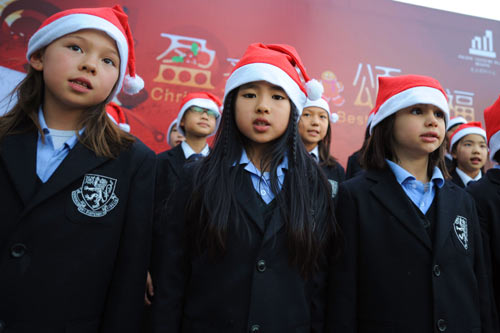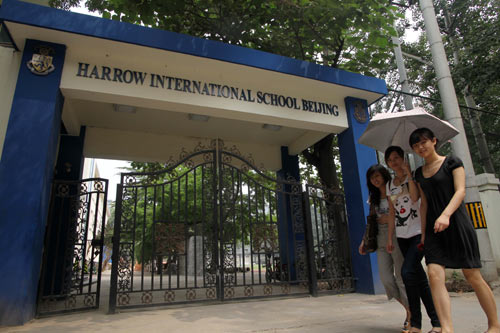Focus
Harrow tapping Asian market
By Ming Yeung (China Daily)
Updated: 2010-07-30 07:49
 |
Large Medium Small |
|
 Students from Harrow International School Beijing singing a Christmas song outside a shopping mall in Beijing last December. [Yang Tianxiao / For China Daily] |
Tradition and prestige, for generations, have attracted students from afar to Harrow. Now, as Ming Yeung tells us, the prestigious school moving east, bringing traditional English education closer to home for Asian students.
Winston Churchill likely would never have imagined that Harrow, the famed institution where he received his earliest schooling and began to develop his leadership skills, would some day open satellite schools in Asia.
The venerable old school began its expansion eastward in 1998. That's when Harrow opened its first international satellite school in Bangkok, in part because of the school's long history with the royal family of Thailand, extending as far back as the 19th century. Twenty-three Thai princes have been schooled at Harrow.
Seven years after opening the Bangkok institution, Harrow expanded to Beijing. In 2012, Harrow will become Hong Kong's first international boarding school.
The prestigious school chose Beijing because the capital city is regarded as cultural and political center in a growing economy.
"Education generally is not a leader in social changes but a follower. It reflects social changes," acknowledged Mark Hensman, Executive Headmaster and Chief Operating Officer of the Harrow Group of International School.
Corporate globalization started before education began to globalize. Now there is a trend in international education toward corporatization.
Harrow upholds traditional values in education. It tends to be, as Hensman put it, more holistic and it aims to address all dimensions of human nature. Simply said, traditional education is more teacher-directed and liberal education is more student-directed.
As there are fears concerning certain values and principles these days, traditional education is seen as giving stronger guidance to students.
"If you don't have boundaries, you have chaos. Traditional education provides boundaries for students whereas the modern approach makes the boundaries less visible," he stated, adding that traditional education will never be out-of-date.
Affluent Asians are eager to embrace traditional British education, especially when it may be obtained without paying costly airfares to the UK.
|
|
Apart from members of royal families from around the globe, many world renowned leaders have been shaped at Harrow. The school takes pride in its history of leadership training for its students.
Leadership is not just for the sake of leading - leadership uses knowledge and skills to make the world a better place, said Hensman. "What we want for our students is that at about the time they leave Harrow school, they have the confidence to be able to think for themselves and make good decisions and the determination to carry those through," he added.
The school's success in Bangkok provided impetus to Harrow's decision to expand further into Asia. Harrow has become adept at building close relationships with host cultures. "The special feature of the school is the way that we were able to integrate the Thai culture and the international culture with British flavor," he told China Daily.
Education is highly valued in China. The prestige of a school's tradition and reputation is a lure to Chinese students and their parents.
Parents who want their children to become "citizens of the world", look favorably upon schools that provide teaching in English and take a broader approach to education. Harrow grabbed the golden opportunity to establish a branch in 2005 in Beijing by marketing its programs as Western quality education at reduced prices.
A year at Harrow Beijing costs about $15,000, about half what it would cost in Britain.
Blending the British traditions with Chinese values takes time. Hensman believes fundamental values have to be respected in every cross-cultural situation and the respect comes from knowledge. "There are certain commonalities the British traditions share with the rest of the world - respect and courtesy," he added.
Nevertheless, transplanting a British institution to China presented particular challenges. "There is a lot you have to go through in terms of meetings and local government regulations. In Beijing, there is a very complicated process to establish an international school. It took a long time to get the government's approval," Hensman noted.
Harrow Beijing had to establish two sites owing to soaring land prices there. The Lower School is based in Grassetown while the Upper School occupies the site of a former Chinese primary school in Chaoyang district. "It is not easy to run the school in separate sites and it creates inefficiency," Hensman said.
"We are hoping to relocate the whole school. It is not so much whether it's in or outside the city; it is that we need lots of land." Due to the lack of space, Harrow Beijing is not offering its students accommodation at the present time.
Harrow Beijing sets a good example for its third branch in Asia - Harrow Hong Kong - in its design and curriculum. "We study how the British curriculum may be made more relevant on the mainland and in Hong Kong due to their different context," Hensman said.
As Hong Kong people still attach great fondness to the old British regime, Harrow is definitely a shiny new toy to the 72,000 nostalgic millionaires who are eager to enroll their kids in notable schools but reluctant to send them far away.
Hensman sees Harrow Hong Kong as a complement rather than a competitor to Harrow Beijing. There are opportunities to make better use of resources. For example, year 8 students will be able to spend time in one of the other schools and teachers will be able to move between schools.
Some may be concerned over whether Harrow is expanding too much and too far, possibly at the expense of the quality of education.
Hensman emphasized that the quality of Harrow's international schools is assured by three annual inspections undertaken by the board of governors.
Unlike other corporations, Harrow intends to limit its expansion to only five satellite schools so as to maintain quality control. Harrow is eyeing Japan and India as possible locations for its next expansions.
As the Executive Headmaster of Harrow, Hensman is required to travel frequently to ensure consistency among the schools. "We want each school to be unique and to have its own identity. The group needs to strive for a balance between following common policies and also being able to develop its own identity and relation to a particular context," he said.
